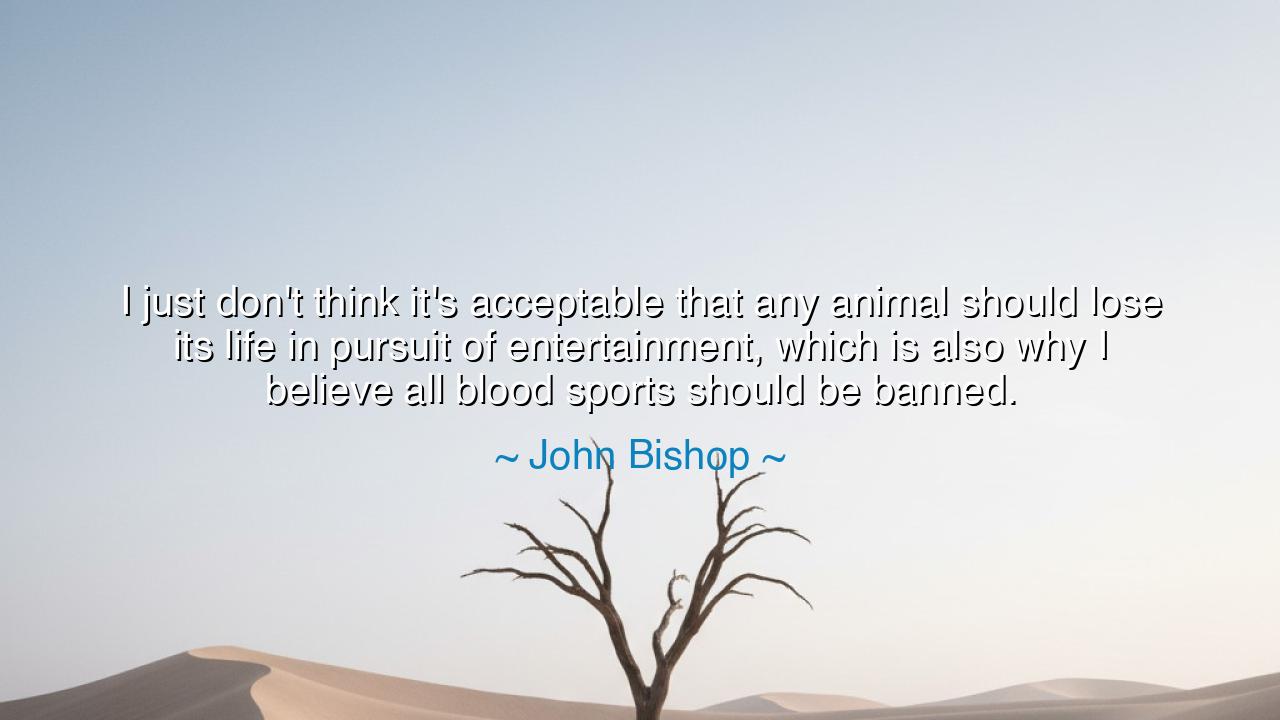
I just don't think it's acceptable that any animal should lose
I just don't think it's acceptable that any animal should lose its life in pursuit of entertainment, which is also why I believe all blood sports should be banned.






John Bishop, a voice of both humor and conscience, once declared: “I just don't think it's acceptable that any animal should lose its life in pursuit of entertainment, which is also why I believe all blood sports should be banned.” These words are not idle sentiment but the cry of compassion against cruelty, the recognition that life itself—whether in man or beast—is sacred, and should not be squandered for amusement. He speaks not only as an entertainer but as a human being bearing witness to the moral weight of our choices, calling us to remember that entertainment loses its nobility when it is built upon suffering.
In the days of ancient Rome, blood sports filled the Colosseum. Gladiators clashed, beasts were slain, and crowds roared in delight as rivers of life spilled upon the sand. Lions, tigers, and bears were torn from distant lands, not to live with dignity in their own kingdoms, but to die for the fleeting joy of the mob. To some, these games were glory; but to the wise, they revealed the descent of a people who found pleasure in death rather than reverence for life. Bishop’s words echo as an antidote to this old poison: a reminder that no society grows noble by feasting on suffering, whether of men or of creatures.
Consider the tale of bullfighting in Spain. For centuries, it was exalted as art, as ritual, as a proud dance between man and beast. Yet beneath the pageantry lies the slow torment of an animal, sacrificed not for survival but for spectacle. The matador may be cheered as a hero, but the bull dies unseen in its agony. Over time, more voices have risen against it, echoing Bishop’s conviction, until entire regions have turned away from this ancient cruelty, recognizing that true courage lies not in killing the defenseless but in protecting the vulnerable.
The ancients also knew another truth: that to honor animals was to honor the divine. In Egypt, cats were revered; in India, cows were sacred; among Native tribes, the buffalo was treated as a brother. To kill these beings carelessly, or for amusement, was seen not as sport but as sacrilege. In every culture, there are remnants of this wisdom—that the life of the animal is a thread woven into the same tapestry as our own. Bishop’s call to end blood sports is not a modern fashion, but a return to this ancient reverence for the bond between man and beast.
The lesson, then, is powerful: a society reveals its heart not by how it treats its powerful, but by how it treats the powerless. To destroy life for entertainment is to empty joy of meaning, to build laughter upon bones. True greatness is not found in domination, but in stewardship. Just as the farmer tends his animals with care, just as the shepherd guards his flock, so too must we learn that the measure of humanity is compassion, not conquest.
What then must we do? We must turn away from cruelty disguised as culture, from violence paraded as tradition. We must raise our voices, as Bishop has, to say: “This is not acceptable.” Support sports and entertainments that elevate skill, discipline, and creativity rather than blood. Teach the young not to cheer for suffering but to honor life. Protect the innocent, whether human or animal, from the tyranny of amusement that destroys rather than builds.
For in the end, Bishop’s words call us to a higher way: to a joy untainted by death, to an entertainment rooted in respect, to a humanity that measures its greatness not by the power to kill but by the will to protect. And so let it be passed down as wisdom: all blood sports must fall, for life itself is too sacred to be wasted for spectacle.






AAdministratorAdministrator
Welcome, honored guests. Please leave a comment, we will respond soon